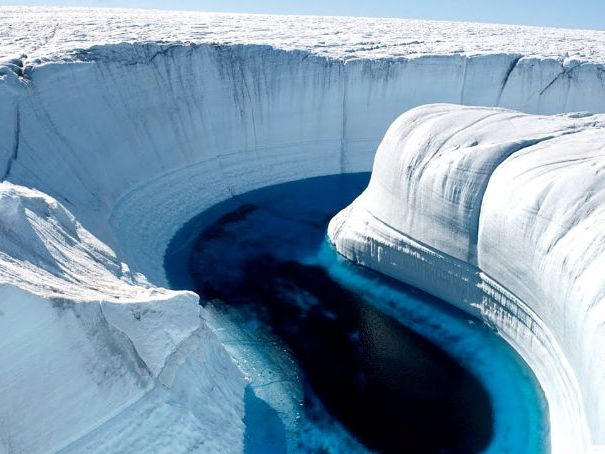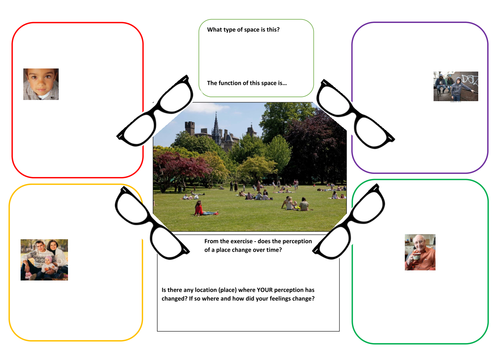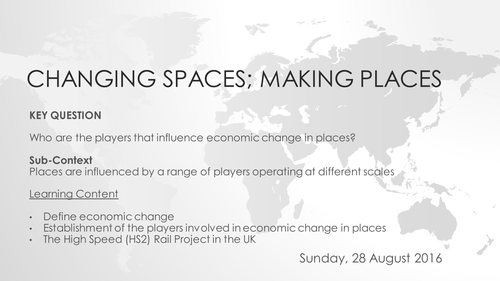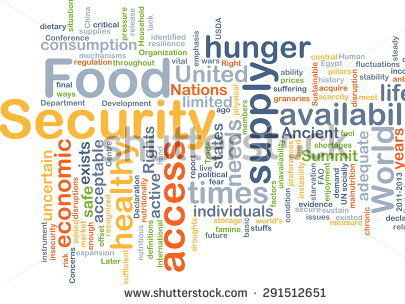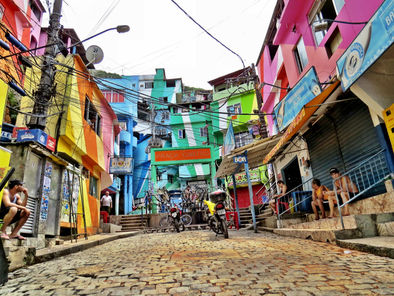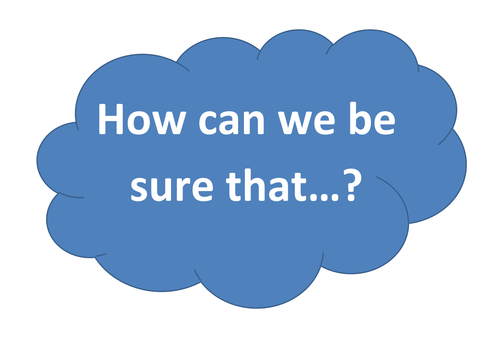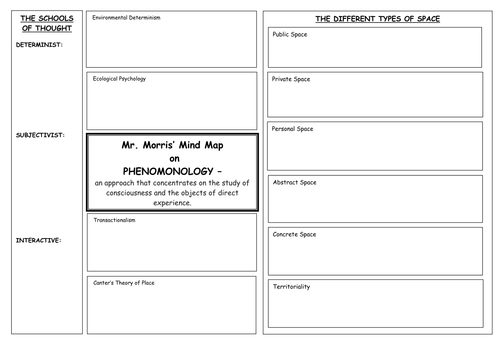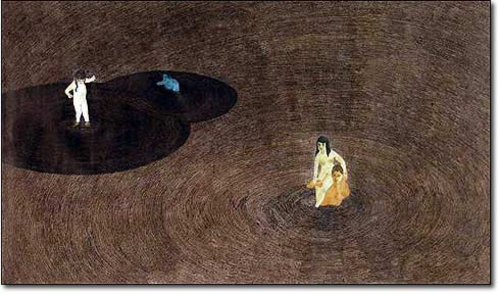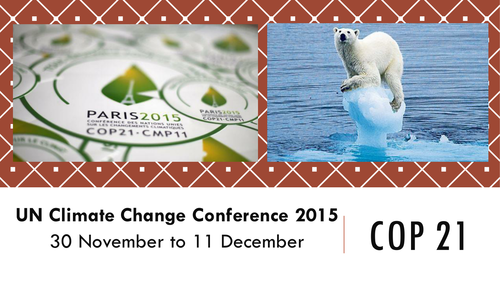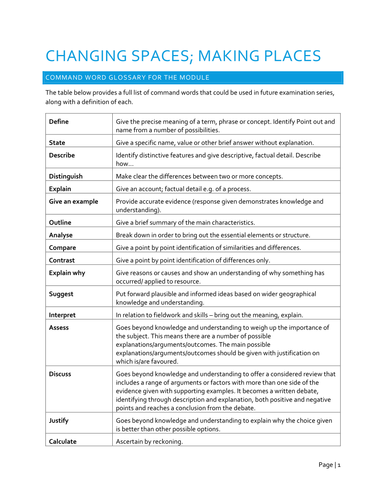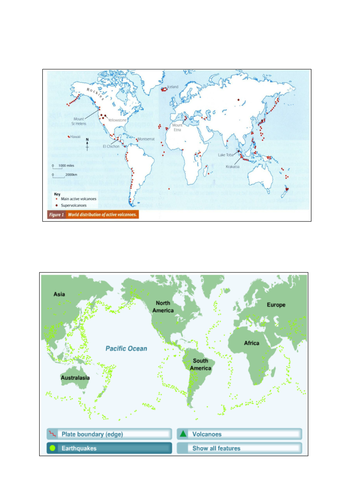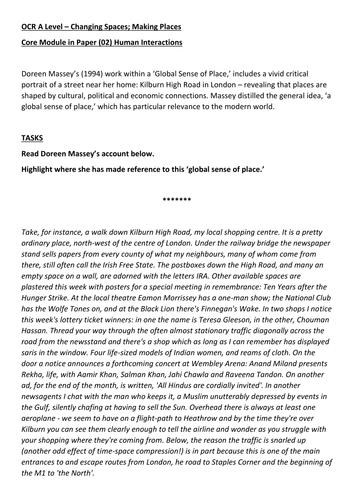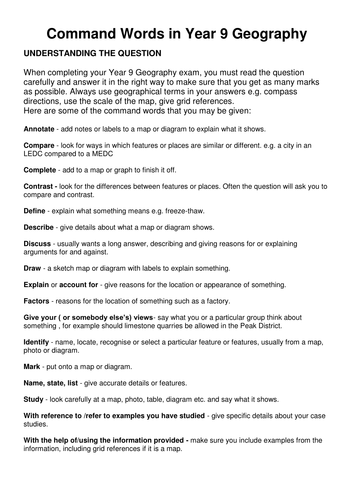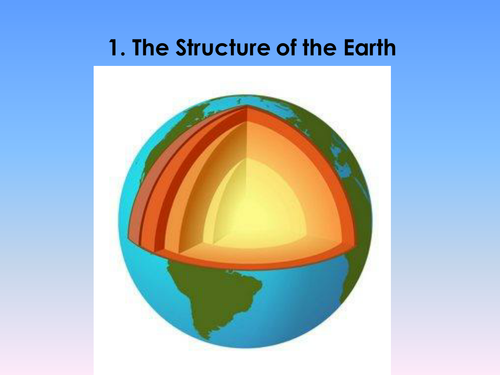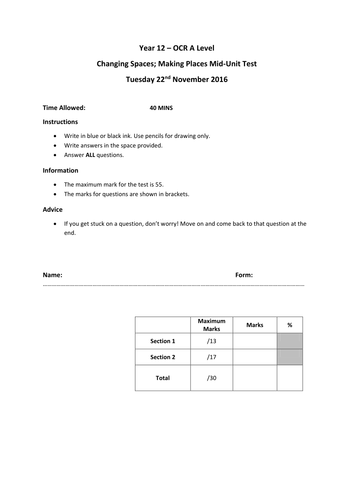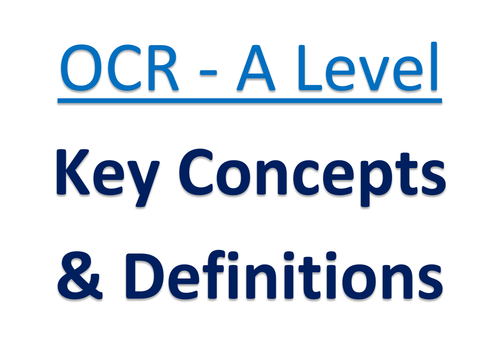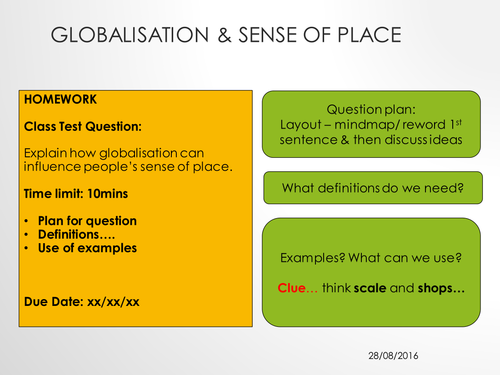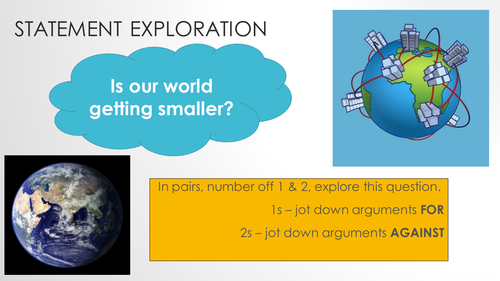
22Uploads
12k+Views
4k+Downloads
All resources

KS3 - Ice on the Land - Antarctica & Ernest Shackleton
Three worksheets on Antarctica and the experiences of what Ernest Shackleton and his crew endured in the early part of the 20th century.
Worksheet 1 - Your Antarctica
Worksheet 2 - The Recruitment Exercise
Worksheet 3 - Shackleton's Journey
These three worksheets would work well as part of a KS3 glaciers/ ice on the land lesson.

OCR A Level - Changing Spaces; Making Places - Place Rebranding
A lesson focused on the fifth question of the Changing Spaces; Making Places unit - Rebranding of Places.
How are places created through placemaking processes?
Lesson Outline
Settler: Recap of the Place = Location + Meaning equation
Starter: Studying key places, what are the words associated with that place? Discussion to follow after.
Main: Explanation of the key terms: rebranding, regeneration and reimaging.
Student-led Main task: Completion of the A3 worksheet focusing on strategies and elements
Plenary: Explanation of structuring exam style questions on rebranding.

OCR A Level - Changing Spaces; Making Places - Lesson 3 - Perception of Place
A fully resourced lesson for how different people perceive places in different ways.
Following the GRASP acronym, students learn about how age, gender, sexuality and role performed in society influences the way we see the world. The 'R' forms part of the student's homework.

OCR A Level - Changing Spaces; Making Places - Lesson A - Players of Economic Change
This is the first lesson of the fourth major question stated in the OCR Delivery Guide - Who are the players that influence economic change in places?
The lesson looks at how places might be influenced by a range of players (stakeholders) operating at different scales. Students settle down with acronyms associated with projects, try to define 'economic change,' followed by who (players) might be involved in a public sector project. The knowledge builds up with an introduction and information about the UK's HS2 rail project and a cost-benefit analysis of the project.

OCR A Level - Future of Food - Lesson 1 - Introduction
First lesson of the new OCR A Level course on the Geographical Debates topic - Future of Food.
Resources include:
1. Key command words that will be used in the new examinations.
2. A glossary of the key words used within the Future of Food module.
3. A breakdown of the course content for the students.
4. A fully resourced PPT for the introduction to food security and the three pillars of food security.
5. Millennium Development Goals and Sustainable Development Goals

KS3 - Living in a Favela Worksheet
Two worksheets to introduce KS3 students to settlements in EDCs and LIDCs.
Worksheet 1 - Key facts about Favelas
Worksheet 2 - Sights/ Smells/ Sounds and Feelings associated with favela life.

KS3 to A Level - Open Questions Display
An open questions display document that encourages the pupils to think about geographical topics more broadly.
This display is also useful for teachers to use and stimulate class discussion with their pupils.
Questions include:
> How can we be sure that...?
> What is wrong with...?
> What does that tell us about...?

OCR A Level - Changing Spaces; Making Places - Lesson 2 - Space & Place
A fully resourced lesson on the differences of space and place, alongside the schools of thought that exist on the interactions of humans within their environment. Students are introduced to the concepts of place and space and learn about, 'phenomenology,' so as to provide students with a theoretical framework in which to consider the meanings of space and place further.
***NEW: Teacher's notes on (and extended theory notes for students) on proxemics and phenomenology. These additions aid the understanding of place theory and will subsequently allow for students to have a deeper, theoretical background to this new A Level topic.***
Bundle

OCR A Level - Changing Spaces; Making Places - How do we understand place?
Everybody loves a bargain and save 33%!! Have a hassle-free start to term and forget planning a whole new topic with this great value bundle!
The OCR delivery guide for Changing Spaces; Making Places is centred around 5 main questions.
This resource bundle is for the second question: How do we understand place?
This bundle provides your students with the complete toolkit to understanding people's sense and perception of place and space.
Lessons included:
1. Introduction to Place
2. Place & Space
3. Perceptions of Place
4. Globalisation & Sense of Place
4A. Globalisation Exam Question
5. Representations of Place

UN Climate Change - COP21 - Paris 2015
A Key Stage 3 resource designed for a 35mins single lesson with homework or a 70mins double lesson with the activity taking place within the classroom.
The activity is designed for use with tablets involving individual/ pair work to find out more about the Paris Climate Change summit of 2015.

OCR A Level - Changing Spaces; Making Places - Lesson 1 - Place Introduction
First lesson of the new OCR A Level course on Changing Spaces; Making Places.
Resources include:
1. Key command words that will be used in the new examinations.
2. A glossary of the key words used within the Changing Spaces; Making Places module.
3. A breakdown of the course content for the students.
4. A fully resourced PPT for the introduction to place.
5. Worksheets for the main and plenary tasks.

Hazardous Earth - AfL Lesson Exercise with KS3 - Improving Extended Writing
This KS3 lesson is based around AfL and how KS3 geographers can improve their extended writing ability. I include the test paper which would be completed in the lesson beforehand, so as to allow the use of peer and self-assessment in the lesson supplied.

OCR A Level - Changing Spaces; Making Places - Lesson 5 - Representations of Place
A fully resourced lesson complete with worksheets for the theme of how place is represented by different agencies.
Resources include:
1. Worksheet for Slumdog Millionaire, Billy Elliot and Love Actually.
2. What type of representation is it? Starter activity.
3. Formal, Informal & Abstract Representation PowerPoint presentation.
4. As part of the RGS' handout on Changing Spaces; Making Places - Doreen Massey's (1994) extract of Kilburn High Road, London. Literature homework.

OCR A Level - Future of Food - Lesson 2 - Spatial Differences
A fully resourced lesson on the spatial differences to food security. This includes the definition to the Global Hunger Index (GHI), alongside the indicators that contribute to the Global Hunger Index. The lesson with map-based skills and a four mark "describe" question on the spatial distribution of moderate, serious, alarming and extremely alarming countries as part of the GHI.

KS3 - Hazardous Earth - Introduction to Landscape Change
A lesson introducing landscape change to KS3 geographers and how these changes are either fast/ slow and human/ physical.
The lesson includes key words and a glossary for the Hazardous Earth course, that will be encountered in subsequent lessons. Fully resourced with high quality images to grasp the students' attention.

KS3 - Hazardous Earth - Plate Tectonics Introduction
A kinaesthetic KS3 lesson involving the students' working with hard-boiled eggs to represent the internal structure of the Earth. You will need to purchase (and boil!) some hard-boiled eggs prior to delivering the lesson - suggested format: 1 egg between 2 pupils.
Fully resourced lesson involving two PowerPoints and a jigsaw worksheet.

OCR A Level - Changing Spaces; Making Places - Mid Unit Assessment Paper
A mid-unit assessment test for the Changing Spaces; Making Places. The questions in the paper focus predominantly on the first two questions of the module as highlighted in the OCR specification. The questions are:
- What is in a place?
- How do we understand a place?
The assessment test is out of 30 with individual marks for questions ranging from 2 to 6. There is an associated mark-scheme with the paper.

OCR A Level - Key Concepts & Words Display
The new OCR A Level is focused around 16 main concepts and words across the different modules. This colourful display provides definitions for each of the 16 concepts.
Words/ concepts included: risk, interdependence, sustainability, resilience and causality.

OCR A Level - Changing Spaces; Making Places - Lesson 4A - Globalisation Exam Question
This is the sequel to Lesson 4 which dealt with the concept of globalisation and sense of place. The lesson focus surrounds the assessment of a extended written answer. Fully resourced lesson complete with question, mark scheme and AfL PowerPoint.
New course. No previous resources. How are you going to incorporate AfL within your teaching, when there are no previous past papers on the topic? This lesson is ready to go for YOU!

OCR A Level - Changing Spaces; Making Places - Lesson 4 - Globalisation & Place
A fully resourced lesson that starts with a discussion and definitions of the two key concepts (time-space compression and globalisation) that form the backbone of the lesson. The second part of the lesson uses ICT to research key components responsible for time-space compression and globalisation.

